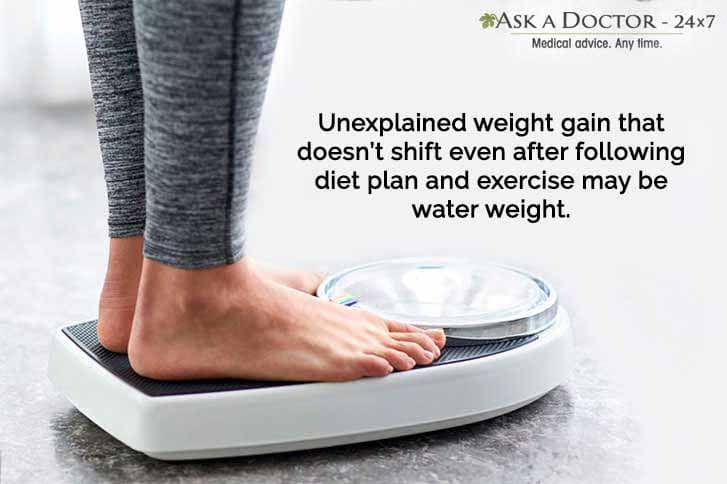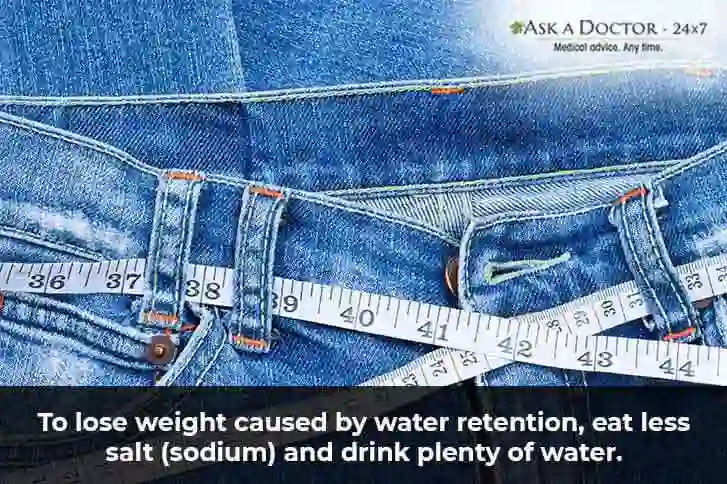Recognize Water Retention And Lose Water Weight With These Simple Steps!
Almost 60% of our body is made up of water. The much needed water content is vital for processes, metabolism, regulating functions of vital organs such as brain, skin, lungs, muscles, kidneys and more. Excess amount of water may sometimes accumulate inside our body, and when this is not removed it results in water retention, also known as edema. Ultimately, the excess fluid builds up in our body leading to bloating and puffiness.
How to Recognize Water Retention

An unusual weight gain that can’t be dealt with despite healthy eating or physical activities may indicate water weight. These are the mystery kilograms you supposedly gain in no span of time.
The first sign of water retention is often a swelling in the extremities. Abdominal bloating is generally a common symptom seen in people with water weight. Swelling in joints or fingers, and indentations in skin without any background problem may also point to water retention.
5 Tips to Lose Water Weight

Water weight is mostly temporary and can be easily gotten rid of. It may take some lifestyle modifications to lose the extra weight naturally. Some tips may help you shed extra kilograms resulting from water retention in your cells.
Here are five steps you can take to deal with water retention.
1. Cutting down on sodium - Salt (sodium) makes you gain water weight. To balance the sodium-water ratio, our cells tend to retain water. Taking too much salt causes water retention. Table salt and processed food have high sodium content which can make you retain water, adding to your body weight. So switch to fresh fruits and vegetables and low salt diet to limit salt intake.
2. Eating more potassium - Potassium can help negate the ill-effects of excess sodium. Studies suggest, high potassium intake can help flush off sodium from your body, one of the many benefits potassium has to offer. Increase your daily potassium intake to get rid of extra water from your body. Sweet potato, yogurt, banana, beans, watermelon are some of the foods rich in potassium.
3. Increasing magnesium intake - A catalyst for various chemical processes going on inside our bodies, magnesium is an extremely essential part of our diet. Magnesium is known to help with reversing water weight especially in women who tend to retain water due to hormonal imbalances. Magnesium-rich foods include green leafy vegetables, whole grains, beans, peas, and nuts.
4. Slashing down carbs - Limiting carbohydrate intake can help you deal with water retention issues. Extra carbs get converted to glycogen, which is then stored in muscles for later use. Water accompanies glycogen, thus adding to your water weight. Switch to a healthier low-carb diet in order to deal with water weight.
5. Drinking more water - It may sound surprising but this is a very useful way to bring down your water weight. Our bodies, to prevent the state of dehydration, tend to retain more water than is necessary. To overcome this, drinking adequate amount of water is highly recommended.
Along with following these tips, try to negate too much salt consumption by drinking more water.
The Upshot

It is important to know the reasons behind the symptoms resulting from water weight. Talk to our specialist if you wish to know more about the underlying causes of your weight gain.
If your symptoms relate to water retention, try the above mentioned ways to deal with those annoying extra kilos. In some cases, water retention may be a sign of an underlying problem. So always ask a doctor if it lasts more than a week and is accompanied by other symptoms.
To know more about water weight and water retention and seek medical help for the same, contact us today!
Ask a Specialist
Recent Questions


